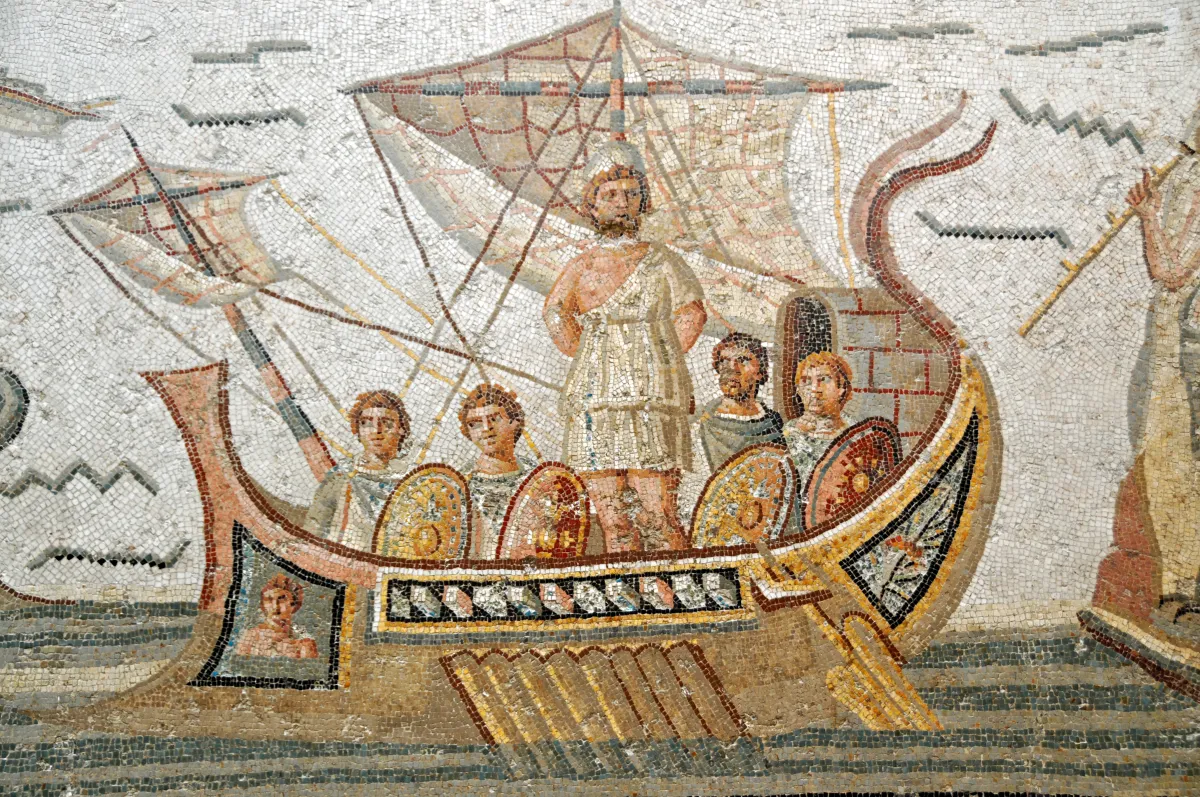To them whom Thou lovest
A Ulyssean musing

Dear Friends,
If you want to talk about Ulysses, it must be taken for granted that you will be in for an epic. But if you want to set out upon an odyssey, the best place to start is inside a person’s head.
Why?
Within every man, woman, child, animal, vegetable, and maybe even mineral (we are not sure, but the scientists are always discovering some new fact), there exists a hidden, complete world, usually wondrous and vast, often backwards, and sometimes slithy: a world known only to the individual being. The multiverse be damned: this is the multiverse. It is this world which is implied in the saying about the tree falling in the forest, when no one is there to “hear” it. Surely, it displaces the air, and forms sound waves; but to hear—as to be deaf—is a human invention!
It is debatable what is more worthy of serious study: the verbosely expressed, mundane thoughts of a common person, or the melodramatic prolixity of a so-called hero’s tale. But no matter, for any work of art devoted to either task has a tendency toward being overwrought; and the consumption of any such work generally illustrates this fact, if not at once, then upon closer inspection.
Joyce’s Ulysses and The Odyssey of Homer are certainly no exceptions to this rule, in spite of both having been, since their respective creations, the subject of serious—indeed, for some, lifelong—study. One is left to wonder whether, perhaps, these works might constitute special cases of the exception proving the rule. Alas, it were impossible to verify this supposition, without also devoting copious amounts of time to actual study of the works themselves.
Cortical blindness is a total or partial loss of vision. It is caused not by damage to the eye, but to the occipital cortex of the brain. The sardonic cruelty of this form of blindness is that only the interpretation of the visual world is missing, while the seeing apparatus is, typically, fully intact! In contrast, in the case of such works as those cited above, one may find oneself wishing for a sort of literary form of this blindness, such that the interpretation could be squelched, while the original source materials—a straightforward tale of surviving a dramatic, decade-long journey home; or the worthless-but-to-himself, if at times also intricate and fascinating, thoughts of one particular man, on one particular day—might be suffered somehow to retain their original lustre.
John Milton was known to be blind, albeit not from birth. His seminal work, Paradise Lost, is, on its face, a treatment of the Fall of Man from God’s grace. But Paradise, (as well as, clearly, his later work “When I Consider How My Light is Spent,” aptly if clumsily renamed by an editor as “On His Blindness”) is ultimately concerned with vision, but in a metaphysical sense. Paradise was lost, because of the desire of man to become aware: to see. (Cynics may argue it was lost due to God’s arrogant—maybe even sadistic—desire to prevent His own children from fully understanding His creation; but these are just details.) And yet, in the writing of Paradise, Milton was also making an attempt to come to terms with the loss of his own Paradise: his own ability to perceive Creation. By merit of the catharsis implicit in any meaningful act of creation, Milton presumably regained a bit of his own paradise lost.
While modern scholars differ as to whether Homer was blind—and Joyce certainly was not, other than figuratively, at times—it is worth wondering whether anyone living prior to our post-literate age ever thought to have done anything to prevent the creation of such apparently overwritten masterpieces, if only in the hope that these obvious iconoclasts might have created something of even greater value than they did.
It is not that these works have no value whatsoever; rather, it is that their main value seems to lie, like that of Paradise Lost, in the very act of creating the writing itself. The pleasure is reserved almost exclusively to the author, even—or perhaps especially—in the case of such widely revered works. This is true primarily because the works either are so incredibly dense, or else—as with Mozart’s own masterpiece, Don Giovanni (a far cry from his often trite output, given that it was written to his own musical specifications, rather than to those of his philistine patrons)—so legitimately advanced in their design as to defy the ability of mere mortals (well, most of them) to understand them in the least.
In the event, the inscrutability of such works of art only rarely serves to undermine their value. Rather, one comes to realise, it is in the act of considering them—whether casually, deeply, or in some cases not at all—that the true genius of these works becomes visible. Their value lies almost wholly in their ability to reflect the universal condition of being human. Moreover, to the extent that a given piece does not possess this quality, it tends to lack merit; but that is another argument entirely.
Art helps one to approach an understanding that the only epic hero which exists at all may be that which exists within the unique life of each human being—perhaps, also, of each animal, vegetable, and maybe even mineral (we are not sure, but the scientists are always discovering some new fact). It is this inner hero who is made manifest in the form of each person’s thoughts and actions.
The act of writing, whether that may result in Ulysses, The Odyssey, Paradise Lost, Don Giovanni—or even a note left for your lover, so that she may discover it on the breakfast table after you have left for the coal mines—is most obviously a simple act of observation, thought, distillation.
But far more important than this, writing is one of the most detached—that is to say, supremely selfless—sorts of love, in that it is a memorialisation, directed at the unknown reader, of a unique thought or moment. The difficulty of such writing-as-love, for the benefit of another, unknowable person (for even a private work will be read by your future, unknowable self), calls to mind the almost incredible truth that—for a human being—to love is the only real task, our only real calling or duty. This fact is summed up in the words of Rilke: “For one human being to love another: that is perhaps the most difficult of all our tasks…the work for which all other work is but preparation.”1
Paradoxically, in preparing for the work of loving, we perform many other inadvertent acts of love along the way: we learn how better to love those whom we already love, while caught up in the act of loving them!
In the end, nothing else matters.
Warmly,
Thomas
1Rilke, Rainer Maria, and Kappus, Franz Xaver. Letters to a Young Poet. Translated by Herter Norton, M.D. New York: W.W. Norton & Co., 1966.
Backstage: Why this essay was written





 Support Us
Support Us
Comments ()